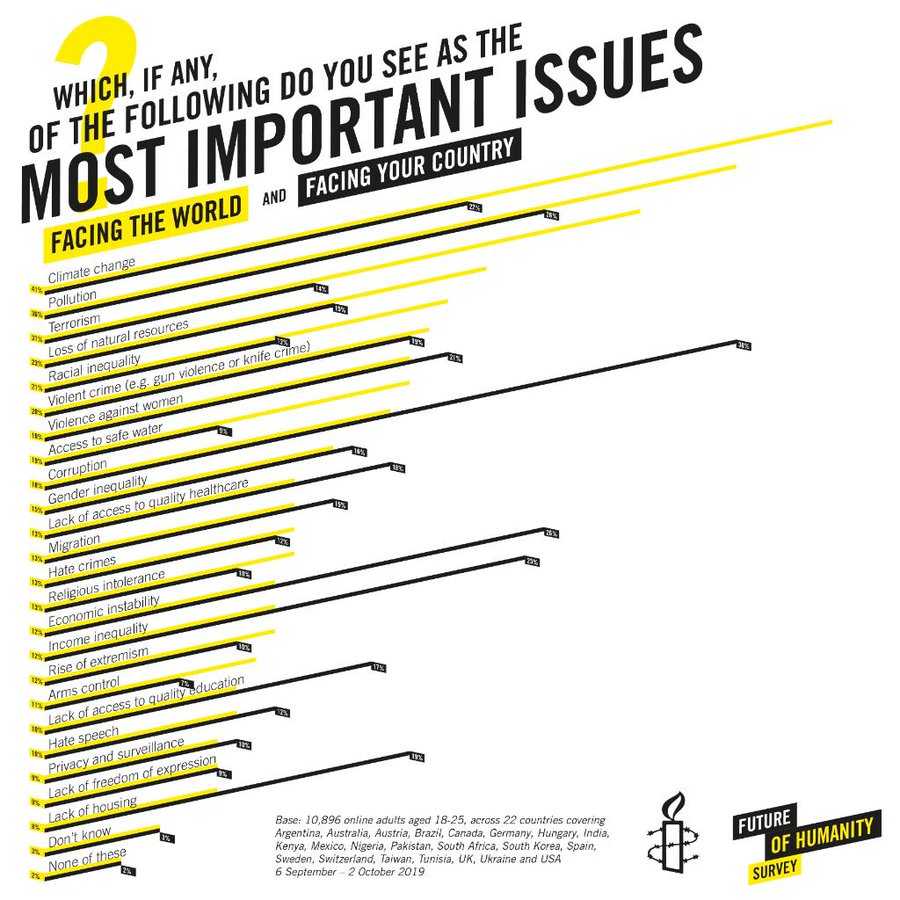Citing Climate Crisis as Top Concern for Future of Humanity, Young Adults Say They Are Living in 'Failed System': Amnesty Poll
Published on
by
"This is a wake-up call to world leaders that they must take far more decisive action to tackle the climate emergency or risk betraying younger generations further."
by

Thousands of demonstrators gather at the Jungfernstieg in Hamburg during one of many Global Climate Strikes in September. (Photo: Axel Heimken/Picture Alliance via Getty Images)
As rights groups around the world marked Human Rights Day on Tuesday, Amnesty International released the results of a survey of 10,000 young adults regarding their top global concerns heading into a new decade, reporting that the climate crisis is what a majority of young people see as a major threat to their human rights.The group's "Future of Humanity" survey polled members of Generation Z between the ages of 18 and 25, asking young adults from 22 countries—including Nigeria, Pakistan, Spain, Tunisia, and the U.S.—about their biggest concerns.
For #HumanRightsDay this year we polled young people around the world to find out what they think about human rights and the future of humanity. This is what they said. Agree?

Three months after an estimated six million people rallied all over the world in a Global Climate Strike—led by 16-year-old climate campaigner Greta Thunberg and several youth-led groups—41% of respondents named accelerating climate change as the biggest sign that previous generations have failed them, while 36% cited pollution.
"In this year when young people mobilized in huge numbers for the climate, it can be no surprise that many of those surveyed saw it as one of the most important issues facing the world," said Kumi Naidoo, secretary general of Amnesty International. "The right to a healthy environment, including a safe climate, is essential for the enjoyment of so many other rights. It is a right that young people today have been forced to take the lead in asserting."
Climate change was most commonly cited among most important issues facing the world, in survey of 10,000+ young people. It's a wake-up call to leaders that must take decisive action to tackle climate emergency or risk betraying younger generations further. amn.st/60161p65O
Out of 10 environmental issues the respondents were asked about, the warming of the planet was named the most important by 57%.
The poll made clear that young adults consider themselves to be living in a "failed system" in which governments all over the world have subsidized climate-warming fossil fuel extraction for decades and big polluters have bought favorable treatment in the halls of power, amounting to a betrayal of younger and future generations.
The climate crisis was cited as a greater concern for young people than terrorism, which was named by just 31% of respondents—even though in many parts of the world, government leaders have spent the past two decades assuring their constituents that their greatest existential threats lie in terrorist groups from other countries.
"As we mark Human Rights Day, we need to recognize that the climate crisis will arguably be the defining issue for younger generations," said Naidoo. "This is a wake-up call to world leaders that they must take far more decisive action to tackle the climate emergency or risk betraying younger generations further."
Besides the climate crisis, the survey found, young people see major concerns with the way their countries and societies are run and the abuse of power by many world leaders.
When asked about top challenges facing their own countries, 36% of respondents named corruption. Economic instability was named by 26%, income inequality was cited by 25%, and 21% of people named violence against women.
In addition to the Global Climate Strike and regular protests regarding the climate crisis, Amnesty International noted, the survey was released as young people in countries including Iraq, Hong Kong, Lebanon, and Chile are leading uprisings against their government leaders.
"The message from young people is clear. We are living inside a failed system," said Naidoo. "The climate crisis, pollution, corruption, and poor living standards are all windows on an alarming truth about how the powerful have exploited their power for selfish and often short-term gain."
"If the events of 2019 teach us anything, it is that younger generations deserve a seat at the table when it comes to decisions about them," he added. "Unless the voices of those on the frontlines are part of the discussion on how we tackle the challenges facing humanity, the crises we are witnessing in the world will only get worse."
Our work is licensed under a Creative Commons Attribution-Share Alike 3.0 License. Feel free to republish and share widely.



0 Comments:
Post a Comment
Subscribe to Post Comments [Atom]
<< Home